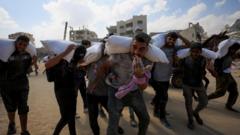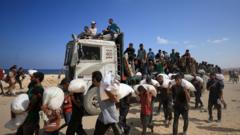An alliance of 28 countries, led by the UK, has condemned Israel's military tactics in Gaza, characterizing them as inhumane and dangerously ineffective. Amid escalating civilian casualties and a humanitarian crisis, the signatories are calling for an immediate ceasefire and more effective aid delivery.
Global Outcry Against Israel's Conduct in Gaza Amid Humanitarian Crisis

Global Outcry Against Israel's Conduct in Gaza Amid Humanitarian Crisis
A collective statement from the UK and 27 nations condemns Israel's treatment of civilians in Gaza, demanding an end to the ongoing violence and improved humanitarian access.
In a significant escalation of international criticism, the UK and 27 other countries have jointly condemned Israel for what they describe as the "inhumane killing" of Gaza civilians who are merely seeking food and water amidst an escalating humanitarian crisis. Their statement expresses grave concern for the well-being of civilians, arguing that the current war tactics have plunged the area's inhabitants into unprecedented despair.
The World Food Programme has issued alarming reports indicating that hunger in Gaza has reached "new levels of desperation." The coalition's statement reflects this sentiment, declaring that "the war in Gaza must end now" and emphasizing that the Israeli government's aid strategy not only endangers lives but also diminishes the dignity of the already suffering Gazan populace.
According to Gaza's Hamas-run health ministry, more than 100 Palestinians reportedly died from Israeli fire over the weekend while awaiting aid. The ministry also cites 19 deaths from malnutrition, a troubling sign as humanitarian conditions deteriorate. However, Israel's foreign ministry dismissed the coalition's concerns as "detached from reality," alleging that Hamas is responsible for the chaos, including hindering humanitarian assistance.
Tensions have surged as Israeli tanks made their first advance into the city of Deir al-Balah, with deadly consequences reported near aid distribution sites. Despite a partial easing of an extensive blockade on aid deliveries, conditions remain dire. The assertion that nearly 800 Palestinians have died while seeking aid since May highlights the risks faced by civilians in pursuit of basic necessities.
The newly established aid system, the Gaza Humanitarian Foundation (GHF), has been criticized for its perceived risks and inefficiencies. The United Nations has refused to cooperate with its model, stating it violates essential humanitarian principles. Recent reports from the UN human rights office corroborate claims of increasing casualties surrounding GHF sites, with the organization documenting at least 674 fatalities linked to these locations.
Tragically, the situation continues to worsen, as hospitals are now incapable of providing even the most basic sustenance for patients and staff, according to Dr. Khalil al-Daqran, a spokesperson for al-Aqsa hospital. Residents are voicing fears regarding food shortages, underscoring the desperation felt by families as essentials become scarce.
The statement by the coalition of nations also opposes Israeli plans to relocate Gaza's population into a so-called "humanitarian city," calling it a violation of international humanitarian law. The foreign ministers involved have urged for an immediate, unconditional ceasefire, indicating readiness to pursue additional measures to incentivize a political resolution, potentially in favor of recognizing a Palestinian state.
In contrast, the Israeli foreign ministry labeled the collective criticism as misplaced, insisting that Hamas is the true obstacle to peace. A representative emphasized, "Hamas, which initiated this war, is spreading false narratives," alleging that they aim to incite further violence against civilians seeking aid.
As global concern mounts, the pressing need for effective humanitarian intervention and a comprehensive ceasefire becomes increasingly evident. The military operations by Israel and their implications for the people of Gaza have ignited fervent discussions on the international stage, highlighting the urgency of a lasting resolution to the ongoing conflict.




















